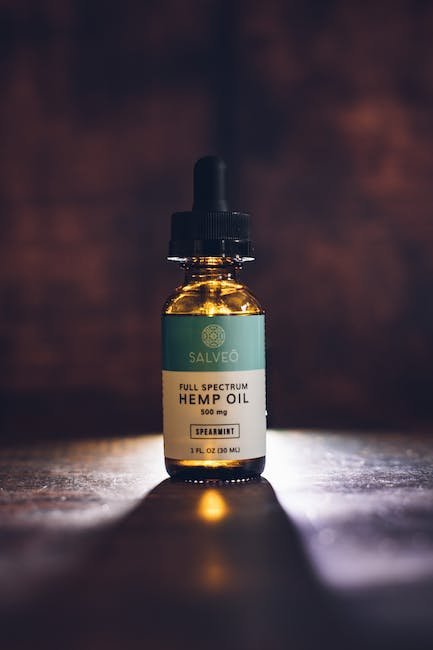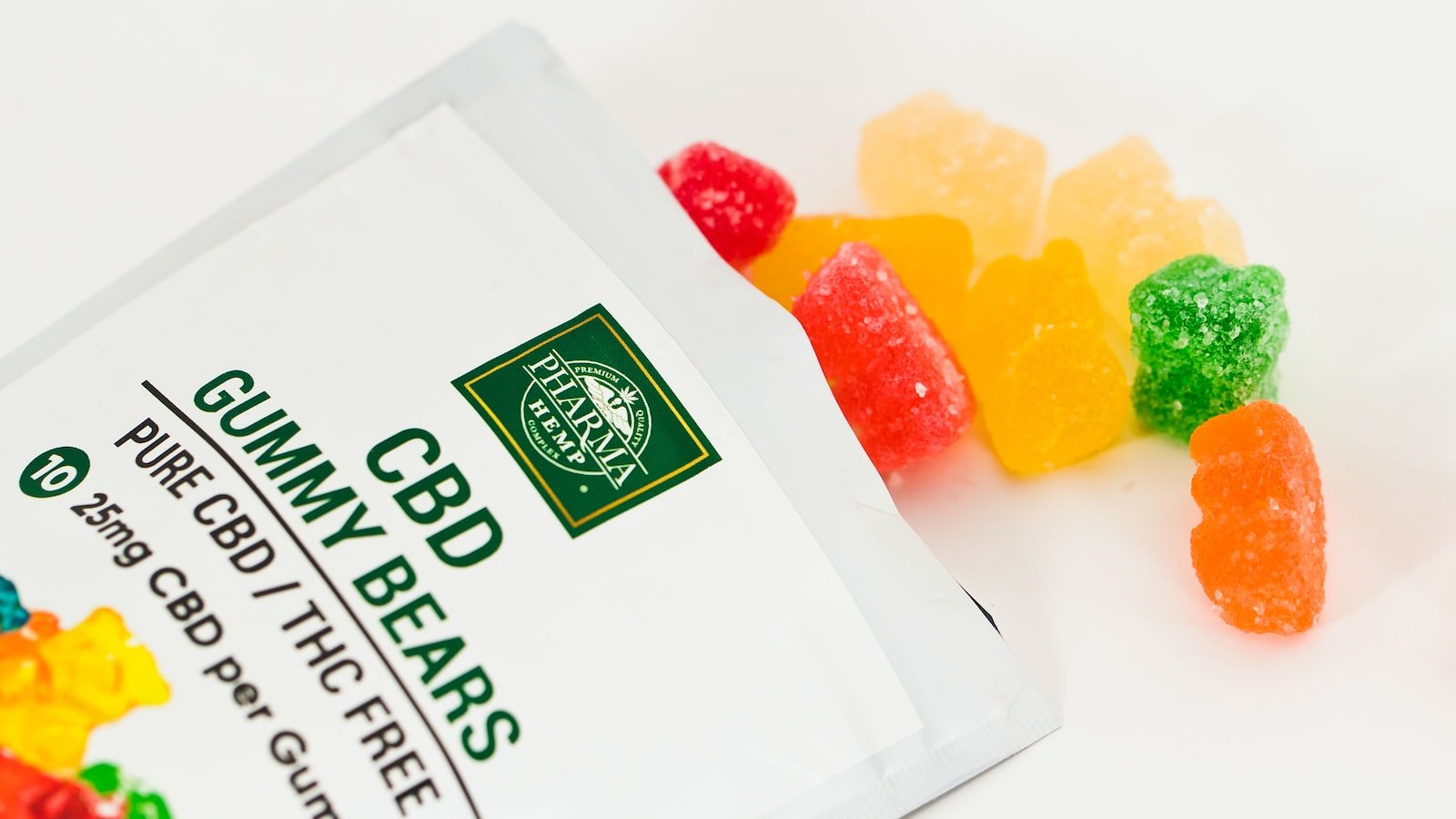With the growing popularity of CBD products for humans, it was only a matter of time before our furry friends joined the trend. Canine CBD use has become a hot topic among pet owners, sparking countless discussions and debates across the internet. However, amidst all the hype, it can be challenging to separate fact from fiction. So, let’s embark on a myth-busting journey as we explore the truth behind the increasingly prevalent use of CBD for dogs. Brace yourselves, because it’s time to uncover the real scoop on this latest pet wellness craze.
Table of Contents
- Unveiling the Truth: Separating Fact from Fiction in Canine CBD Use
- Exploring the Potential Benefits of CBD for Dogs: An In-Depth Analysis
- Understanding the Safety and Risks of CBD Administration in Canines
- How to Choose the Right CBD Product for Your Furry Friend
- Expert Guidelines for Proper Dosage and Administration of Canine CBD
- Q&A
- In Summary

Unveiling the Truth: Separating Fact from Fiction in Canine CBD Use
Many pet owners have turned to CBD (cannabidiol) as a potential solution for various health issues in their beloved canines. However, amidst the growing popularity, myths and misconceptions abound. It’s essential to separate fact from fiction when it comes to the use of CBD for dogs.
Fact: CBD is derived from hemp plants and contains minimal or no THC, the psychoactive compound found in marijuana. This means CBD won’t make your dog high or intoxicated.
Fact: Canine endocannabinoid systems, similar to humans, have receptors that interact with CBD. These receptors are part of a network known as the endocannabinoid system, which plays a crucial role in regulating various bodily functions.
Fact: Scientific studies have shown that CBD may have potential therapeutic benefits for dogs, including pain relief, reducing anxiety, improving appetite, and aiding in certain medical conditions. However, it’s important to note that further research is still needed to fully understand the extent of its effectiveness and any potential side effects.
Myth: CBD is a miracle cure-all for dogs. While CBD has shown promising results in some cases, it is not a panacea. Each dog is unique, and the effects of CBD can vary depending on factors such as the dog’s size, age, underlying health conditions, and the quality of the CBD product administered.
Myth: Any CBD product is safe for dogs. It’s crucial to source CBD products specifically formulated for pets. These products should undergo rigorous testing for quality, purity, and potency to ensure they are safe for canine consumption.
Myth: CBD does not have any potential side effects for dogs. Although generally considered safe, CBD may cause mild side effects such as drowsiness, dry mouth, and changes in appetite or mood in some dogs. It’s recommended to start with a low dose and monitor your dog’s response before adjusting as needed.

Exploring the Potential Benefits of CBD for Dogs: An In-Depth Analysis
“”
As pet owners, we always strive to find the best ways to ensure the well-being of our furry friends. In recent years, a popular topic of discussion has emerged in the world of pet care – the potential benefits of CBD for dogs. CBD, short for cannabidiol, is a non-intoxicating compound derived from the hemp plant. While research is still ongoing, many pet owners are turning to CBD products to help alleviate various health conditions in their dogs.
One of the potential advantages of CBD for dogs is its ability to provide relief for chronic pain and inflammation. Whether it’s due to arthritis, joint issues, or other ailments, CBD has demonstrated promising anti-inflammatory properties. Furthermore, CBD may help manage anxiety and stress in dogs, promoting a sense of calmness and relaxation. Additionally, some studies suggest that CBD could have anti-convulsant properties, making it a potential option for dogs suffering from seizures or epilepsy.
It’s important to note that while CBD holds promise, each dog is unique, and the effects may vary. Consulting with a veterinarian is crucial before incorporating CBD into your dog’s routine. Together, let’s continue exploring the potential benefits of CBD for our beloved pets, keeping their health and happiness at the forefront of our minds.

Understanding the Safety and Risks of CBD Administration in Canines
As more pet owners consider CBD as a potential treatment for their furry companions, it is crucial to have a comprehensive understanding of both the safety and risks associated with its administration in canines. While CBD has gained popularity for its potential benefits in managing various conditions, it is still important to approach its usage with caution and awareness.
Here are key points to consider:
- Potential benefits: CBD is believed to have therapeutic properties that can aid in managing several canine health issues, including pain, anxiety, seizures, and inflammation.
- Minimal psychoactive effects: Unlike THC, the psychoactive component of cannabis, CBD does not typically cause a “high” in dogs.
- Individual sensitivities: Just like humans, canines may react differently to CBD. It’s essential to closely observe your dog’s response and consult with a veterinarian for guidance.
However, it is also important to acknowledge the potential risks:
- Quality and purity: The CBD market is largely unregulated, so ensuring you purchase high-quality, third-party tested products is crucial to minimize potential risks associated with contaminants or inaccurate labeling.
- Drug interactions: CBD can interact with certain medications, making it vital to discuss administering CBD with your veterinarian if your dog is taking any prescription drugs.
- Legal considerations: The legal status of CBD varies between jurisdictions. It is imperative to familiarize yourself with the laws and regulations in your region to ensure compliance.
By understanding both the potential benefits and risks, pet owners can make informed decisions regarding CBD administration for their canine companions. When in doubt, consulting with a veterinarian who has experience and knowledge in CBD treatments can provide valuable guidance in ensuring the welfare and safety of your beloved pet.

How to Choose the Right CBD Product for Your Furry Friend
When it comes to finding the perfect CBD product for your furry friend, there are a few important factors to consider. With the rise in popularity of CBD for pets, it is crucial to ensure that you are selecting a high-quality and safe option that will provide the desired benefits for your beloved companion. Here are some tips to help you make the right choice:
1. Analyze the Source: Start by researching the source of the CBD product. Look for companies that use organically grown hemp and follow strict cultivation practices. Transparency is key, so make sure they provide third-party lab reports that verify the quality and potency of their products.
2. Consider the Formulation: CBD products come in various forms such as oils, treats, and topicals. Consider your pet’s preferences and needs. While oils are versatile and can be easily added to their food, treats offer a convenient and tasty option. If your furry friend suffers from painful joints or skin issues, topicals like salves or creams may be more appropriate.
3. Opt for Full Spectrum: Full spectrum CBD products contain a wide range of cannabinoids, terpenes, and other beneficial compounds found in hemp plants. This synergistic blend can enhance the overall effectiveness of CBD, offering your pet the entourage effect. However, if your pet has sensitivities or if you want to avoid any trace of THC, broad-spectrum CBD can still provide the benefits without the psychoactive element.
Remember, every pet is unique, and their CBD needs may differ. It is always wise to consult with your veterinarian before introducing CBD into your pet’s routine. By following these guidelines, you can make an informed decision and choose the right CBD product that will support the well-being and happiness of your furry friend.
Expert Guidelines for Proper Dosage and Administration of Canine CBD
Ensuring the correct dosage and administration of CBD is essential for maintaining your furry friend’s well-being. Our team of CBD experts has compiled these guidelines to help you navigate the world of canine CBD with confidence.
1. Consult with a Veterinarian
Before starting your dog on CBD, it’s crucial to consult with a trusted veterinarian who is knowledgeable about cannabinoid therapies. They can provide valuable advice tailored to your pup’s specific needs.
2. Pick High-Quality CBD Products
When choosing CBD products for your canine companion, always opt for high-quality, organic options. Look for reputable brands that provide clear information about their sourcing, extraction methods, and third-party lab testing. Your pup deserves nothing but the best!
3. Start Low and Slow
When administering CBD to your dog, it’s recommended to start with a low dosage and gradually increase it until you achieve the desired effect. This approach allows you to assess your pup’s individual response and minimize any potential side effects.
4. Determine the Correct Dosage
The appropriate CBD dosage varies depending on various factors, such as your dog’s size, weight, and overall health. It’s advisable to start with 0.25-0.5mg of CBD per pound of body weight per day and monitor your pet’s response. Adjust the dosage accordingly, under the guidance of your vet.
5. Consistency is Key
For maximum effectiveness, consistency in administering CBD is crucial. Establish a regular dosing schedule that fits your dog’s routine and stick to it. This helps maintain a steady level of CBD in their system, promoting balance and well-being over time.
6. Observe and Monitor
While CBD is generally well-tolerated by dogs, closely observe your pet for any changes in behavior, appetite, or overall condition. Pay attention to possible interactions with other medications and inform your veterinarian about any concerns you may have.
7. Patience and Adjustment
Each dog may respond differently to CBD, so it requires patience and adjustment to find the optimal dosage and administration method. Your pet’s needs may change over time, and regular reassessment with your vet is important to ensure optimal results.
With these expert guidelines, you can confidently incorporate CBD into your canine companion’s wellness routine. Remember, always prioritize your pup’s health and well-being by seeking professional advice and monitoring their response to CBD.
Q&A
1. Can CBD get my dog high?
No, CBD derived from hemp contains only trace amounts of THC, the psychoactive compound found in marijuana. This means that it does not have the intoxicating effects that would make your dog feel high.
2. Is CBD safe for my dog?
When used properly, CBD is generally considered safe for dogs. However, it’s important to consult with your veterinarian before starting your furry friend on any new supplements or medications to ensure it’s appropriate for their specific needs.
3. Will CBD cure all my dog’s health problems?
CBD is not a miracle cure-all. While it may provide relief for certain conditions like pain, anxiety, and inflammation, it’s important to manage your expectations and understand that it may not be a substitute for traditional veterinary care for more serious health issues.
4. Can I give my dog any CBD product for humans?
No, it’s not recommended. Dogs have different sensitivities and metabolisms compared to humans. It’s best to choose CBD products specifically formulated for dogs to ensure the proper dosage and safety for your furry companion.
5. How do I know if CBD is working for my dog?
Every dog is different, so it’s important to monitor your dog’s behavior and symptoms while using CBD. Look for positive changes such as decreased anxiety, improved appetite, or increased mobility. Keep a journal to track any noticeable improvements or side effects.
6. Can I give my dog too much CBD?
While CBD is generally safe, giving your dog excessive amounts can lead to potential side effects such as drowsiness or gastrointestinal issues. It’s important to follow dosage guidelines provided by the manufacturer or consult your vet to avoid overdoing it.
7. Is CBD a legal treatment option for dogs?
The legality of CBD for dogs can vary depending on your location. In many countries, CBD derived from hemp is legal, but CBD derived from marijuana may be subject to more restrictions. It’s important to research and comply with local laws and regulations before using CBD for your dog.
8. Can CBD interact with other medications my dog is taking?
CBD can potentially interact with certain medications, so it’s crucial to consult with your veterinarian if your dog is already on other medications. They can provide guidance on potential drug interactions and help you determine if CBD is a safe addition to your dog’s treatment plan.
9. Is it best to start with a high or low CBD dosage for my dog?
Starting with a low dosage is generally recommended to assess your dog’s individual response to CBD. You can gradually increase the dosage if needed, monitoring their reactions and consulting your vet along the way to find the optimal dose for your dog’s specific needs.
10. Are there any potential side effects of using CBD for dogs?
While side effects are rare, some dogs may experience mild sedation, dry mouth, or slight changes in appetite when first starting CBD. If any unusual symptoms persist or worsen, consult your vet. Overall, CBD is considered safe, but it’s important to monitor your dog’s reaction to ensure their well-being.
In Summary
As we bid farewell to the cloud of misunderstandings surrounding canine CBD use, it’s time to embrace the truth and set our furry friends on a path of relaxation, comfort, and renewed vitality. No longer lost in a sea of myths and misconceptions, we can confidently support our faithful companions in their journey towards optimal wellness. So, as we part ways with the shadows of doubt, let us stride forward, armed with knowledge and a steadfast commitment to providing the best care for our beloved canines.
Gone are the days when the mere mention of CBD would raise eyebrows and elicit skepticism. It’s time to acknowledge the remarkable potential of this natural compound and shatter the erroneous beliefs that have held us back. The misconception that CBD is synonymous with intoxication has finally been laid to rest, revealing its non-psychoactive nature that ensures a peaceful state of mind for our four-legged friends.
Together, we have debunked the myth that CBD is a mere fad, a passing trend that lacks scientific basis. Extensive research and rigorous studies have illuminated the profound impact of CBD on various ailments, from anxiety to chronic pain, offering a glimmer of hope to those who have sought relief for their pets to no avail.
Let us revel in the revelation that canine CBD use is not a one-size-fits-all solution. The beauty of this natural remedy lies in its adaptability, allowing us to tailor the dosage and form to our pets’ individual needs. Whether it’s through delicious treats, tinctures, or soothing balms, we can now offer our canine companions the therapeutic benefits they deserve.
As we set forth on this new chapter of acceptance and enlightenment, let us venture hand-in-paw with groundbreaking veterinarians, who, armed with a wealth of knowledge and compassion, are champions in this evolving field. For it is their guidance and expertise that guides our steps into uncharted territories, ensuring the utmost well-being of our beloved canines.
So, dear readers, as we conclude our journey through the maze of myths surrounding canine CBD use, let us bid farewell to ignorance and embrace a future where truth and enlightenment pave the way. It is time to celebrate the dogged determination that uncovered the facts and allowed us to unleash the potential of this natural remedy. May our dogs bask in the comfort and revitalization that CBD provides, as we revel in the joy of witnessing them thrive.
As an affiliate, my content may feature links to products I personally use and recommend. By taking action, like subscribing or making a purchase, you’ll be supporting my work and fueling my taco cravings at the same time. Win-win, right?
Want to read more? Check out our Affiliate Disclosure page.